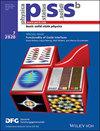合金杂乱效应对嵌入氮化铝势垒的(Al,Ga)N 量子阱发射图各向异性的影响
IF 1.8
4区 物理与天体物理
Q3 PHYSICS, CONDENSED MATTER
引用次数: 0
摘要
测量了一系列富铝 (Al,Ga)N-AlN 量子阱 (QW) 边缘发射的偏振光,这些量子阱是通过分子束外延法在 c 平面蓝宝石上以金属有机化学气相沉积法沉积的 AlN 模板上生长的。研究了在铝含量为 40% 至 90% 的条件下生长的 2 nm 厚 (Al,Ga)N QW 的对比度和发射图的主轴。光在 QW 边缘发射,波长从 280 nm 到 209 nm。研究发现,铝成分在 72% 左右(即发射波长约为 235 nm)时的发射图(相对于平面内取向,从扁球形变为长球形)。边缘发射图的方向和形状表明,(Al,Ga)N 约束层成分的波动深度足以产生价带内混合。这一特性与内置应变和量子约束斯塔克效应共同作用,在铝成分达到 60-70% 时,即在发射波长为 260-235 纳米时,导致了光发射的各向异性。本文章由计算机程序翻译,如有差异,请以英文原文为准。
The Influence of Alloy Disorder Effects on the Anisotropy of Emission Diagrams in (Al,Ga)N Quantum Wells Embedded into AlN Barriers
The polarized photoluminescence emitted on the edge of a series of aluminum‐rich (Al,Ga)N‐AlN quantum wells (QWs) grown by molecular beam epitaxy on AlN templates deposited by metal organic chemical vapor deposition on c‐plane sapphire is measured. The contrast and the principal axis of the emission diagrams for 2 nm‐thick (Al,Ga)N QWs grown for aluminum compositions between 40% and 90% are studied. The light is emitted on the edge of the QWs at wavelengths going from 280 nm down to 209 nm. The emission diagram, a change from oblate to prolate with respect to the in‐plane orientation, for an aluminum composition is found to occur around 72%, that is, at an emission wavelength of about 235 nm. The orientations and shapes of the edge‐emission diagrams indicate that the fluctuations of the composition of the (Al,Ga)N confining layer are deep enough for producing intravalence band mixings. This property, that acts in concert with the built‐in strain and quantum‐confined Stark effect, contributes to the anisotropy of the light emission when the aluminum composition reaches 60–70%, that is, for an emission wavelength of 260–235 nm.
求助全文
通过发布文献求助,成功后即可免费获取论文全文。
去求助
来源期刊
CiteScore
3.30
自引率
6.20%
发文量
321
审稿时长
2 months
期刊介绍:
physica status solidi is devoted to the thorough peer review and the rapid publication of new and important results in all fields of solid state and materials physics, from basic science to applications and devices. Being among the largest and most important international publications, the pss journals publish review articles, letters and original work as well as special issues and conference contributions.
physica status solidi b – basic solid state physics is devoted to topics such as theoretical and experimental investigations of the atomistic and electronic structure of solids in general, phase transitions, electronic and optical properties of low-dimensional, nano-scale, strongly correlated, or disordered systems, superconductivity, magnetism, ferroelectricity etc.

 求助内容:
求助内容: 应助结果提醒方式:
应助结果提醒方式:


